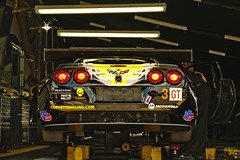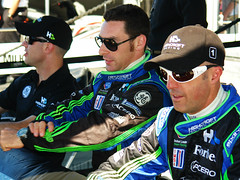The Third Annual Ricardipus Racing Awards!
[cue sounds of crickets chiriping]
Well, these may not be as exciting as the official series awards, but in late August I again trekked out to Mosport International Raceway for the 2010 edition of the American Le Mans Series race weekend, the Mobil 1 Grand Prix of Mosport. History will record that the race was won by a rather speedy Porsche RS Spyder, at the hands of previous Mosport Trans-Am winner Klaus Graf and 2010 24 Hours of Le Mans champion Romain Dumas, on loan from the factory Audi team, more or less.
But, once again, the Ricardipus awards are emphatically not about the race winners - they're about silly things not related in any way to the podium.
So - here we go:
Loudest Vehicle: #3 and #4 Chevrolet Corvette C6.R (tie). The two 'vettes rumbled their way to a win in this category, for the third year running. Nothing else came close, although the Lotus and one of the Porsches from the World Challenge race earlier in the year would have given them a run for their money.

The noisy end of the Corvette.
Friendliest Drivers: Patrón Highcroft Racing - Simon Pagenaud, Marino Franchitti, David Brabham. Truth be told, most ALMS drivers are pretty friendly, but this crew just edged the competition slightly (Romain Dumas from the Cytosport team losing a point or two for talking on his phone a lot). Pagenaud was a co-winner of last year's "Most Cheerful-Looking Driver" award, so this is kind of a double for him. Honourable mention to Paul, Lord Drayson for being generally friendly, cheerful and a lot more available than your average member of the British Peerage.

Brabham (foreground) also wins for "silliest sunglasses", in a tie with series rookie Frankie Montecalvo.
Best Livery Featuring Teeth and Mermaids: Green Earth Team Gunnar. In a surprising development, there was only one entrant in this class, which replaces last year's "Nicest Paint Highlights" category, ably taken then by Melanie Snow's pink-detailed Porsche.

It's also got seashells and fish on it.
Silliest Doors: Drayson Racing Lola B09/60. Just edging out last year's winner, the attractively re-painted Dyson Racing Lola (see below), the Draysonmobile wins by virtue of its reflective silver window coatings - attractive, but undeniably silly.

Also the unofficial winner in the "looks like a space-ship" category.
Special Award: Best-looking Car That Tested on Friday, Crashed on Saturday, and Didn't Race on Sunday: #61 Risi Competizione Ferrari 430GT. Last year, they managed to crash the sister #62 in qualifying, but started the race after an all-night rebuild. This year, although the #62 raced, they weren't able to put Humpty Dumpty (below) back together again in time.

Fun trivia - the driver who crashed this car was Pierre Kaffer, who had trouble with the same turn in a Porsche two years earlier.
And, finally:
Special Award (Public Relations and Marketing category): Best Job of Re-Painting a Car in a Popular "Classic" Livery to Avoid Association with a Company that Just Flooded the Gulf of Mexico With Crude Oil: Dyson Racing. Last year's green-and-white BP livery mysteriously disappeared earlier in the season, in favour of the perennially-popular Castrol colours. The cognoscenti were not fooled - Castrol is, of course, a BP brand.

Great-looking vehicle, in any colour scheme.
So there you go. I'm slightly heartened by these awards being only marginally sillier than the ALMS's "Tightest Firesuit" and "Mr. Modesty" awards, which you can read about here. And, as always, you can see more of the race weekend by heading over to Flickr for the full set of photos.
See also:
2009 edition, featuring loud Corvettes, Gil de Ferran driving through the grass, and pink details on a Porsche.
2008 edition, with a smiley Aston Martin, some horrid day-glo yellow paint highlights, a Ferrari hiding behind a post, and a slightly bent Porsche.


